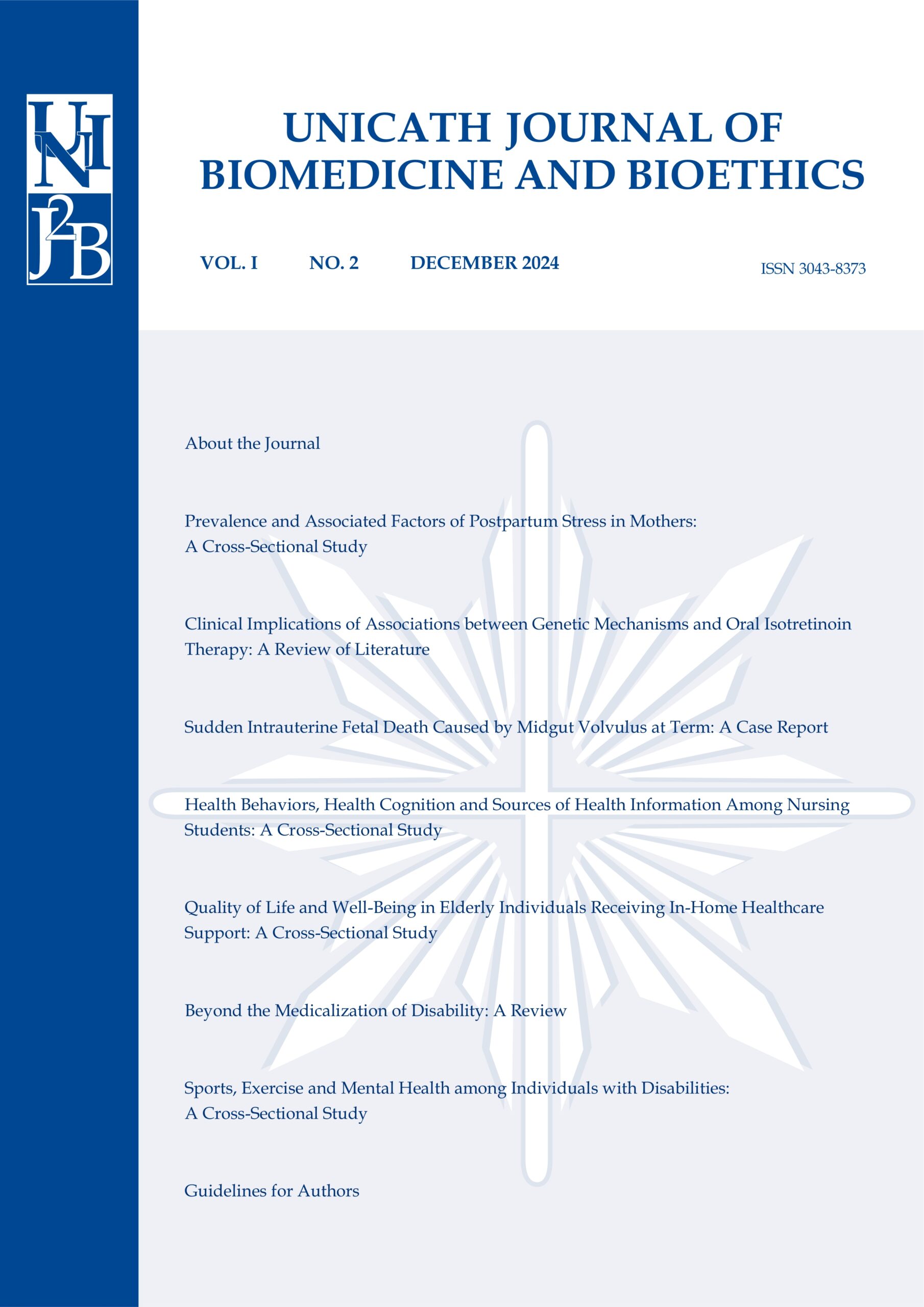UniCath Journal of Biomedicine and Bioethics
VOL.I • NO.2
December 2024
Prevalence and Associated Factors of Postpartum Stress in Mothers: A Cross-Sectional Study
Clinical Implications of Associations between Genetic Mechanisms and Oral Isotretinoin Therapy: A Review of Literature
Sudden Intrauterine Fetal Death Caused by Midgut Volvulus at Term: A Case Report
Health Behaviors, Health Cognition and Sources of Health Information Among Nursing Students: A Cross-Sectional Study
Quality of Life and Well-Being in Elderly Individuals Receiving In-Home Healthcare Support: A Cross-Sectional Study
Beyond the Medicalization of Disability: A Review
Sports, Exercise and Mental Health among Individuals with Disabilities: A Cross-Sectional Study
Prevalence and Associated Factors of Postpartum Stress in Mothers: A Cross-Sectional Study
Lucija Kolić1, Sandra Nakić Radoš2
Abstract
Background: Postpartum stress refers to an unpleasant emotional state caused by stressors that arise during the postpartum period, though its prevalence remains unclear. Previous research indicates that up to 30% of mothers experience emotional difficulties, including stress, during this time. However, postpartum stress is often neglected in maternal mental health research, leading to inconclusive findings. Additionally, studies suggest that elevated stress levels persist throughout the first year after childbirth.
Aim: This study aimed to investigate the frequency of postpartum stress in mothers and the effects of sociodemographic and obstetric variables, as well as social support, on perceived postpartum stress.
Methods: Mothers who had given birth within the previous 6-12 weeks participated in an online survey (N=199). Participants completed the Depression, Anxiety, and Stress Scales, the Maternal Postpartum Stress Scale, the Birth Satisfaction Scale-Revised, the Perceived Partner Support Scale, and the Social Support Appraisals Scale.
Results: The findings revealed that mothers reported higher levels of postpartum-specific stress compared to general stress. Significant predictors of postpartum stress included younger maternal age, planned Caesarean section (C-section), varied infant feeding methods, and lower partner support which explained 34% of the total stress variance.
Conclusion: This study offers valuable insights into the factors contributing to postpartum stress and provides guidance for future interventions aimed at preventing and reducing postpartum stress. This, in turn, can facilitate smoother maternal adjustment to parenthood and promote better child development.
Keywords: psychological stress, postpartum, mothers, birth, social support
1Kindergarten “Maslačak”
Zadar, Croatia
Lucija Kolić
lucija.k@outlook.com
2University Department of Psychology
Catholic University of Croatia
Zagreb, Croatia
Sandra Nakić Radoš
snrados@unicath.hr
ORCID: 0000-0002-8330-8427
Corresponding author:
Sandra Nakić Radoš
University Department of Psychology
Catholic University of Croatia
Ilica 244, Zagreb, Croatia
snrados@unicath.hr
Clinical Implications of Associations between Genetic Mechanisms and Oral Isotretinoin Therapy: A Review of Literature
Luka Bulić1, Eva Brenner1, Nives Pustišek2,3,Suzana Ožanić Bulić2,3
Abstract
Isotretinoin (13-cis-retinoic acid) is a vitamin A derivative most commonly used for the treatment of acne vulgaris. While its therapeutic effectiveness in this skin condition has been demonstrated by numerous studies, oral isotretinoin therapy impacts many other organ systems by interacting with complex genetic mechanisms. Epigenetic modifications make up a large portion of these interactions and they entail induction or suppression of specific gene expressions. While gene expression modification has been shown as important for the mechanism of action of isotretinoin, it is also deemed responsible by some for certain adverse events. Studies have postulated associations between isotretinoin and inflammatory bowel disease (IBD), autoimmune thyroiditis, and skeletal system diseases in the context of specific genetic predispositions. Isotretinoin has also been shown to negatively affect the glucose and lipid metabolic profile via these interactions. Furthermore, it can alter the therapeutic
effect of other drugs by modulating the activity of their metabolizing enzymes. On the other hand, isotretinoin has shown anti-tumor activity and a positive effect in anthracycline cardiotoxicity. The other relevant component of genetic factors in isotretinoin therapy is pharmacogenetics, which entails genetic products that take part in isotretinoin metabolism. Variants in these genes alter the mechanism by which the body metabolizes isotretinoin, which can cause therapeutic ineffectiveness or toxicity depending on the variant. The aim of this review was to provide a synthesis of knowledge regarding these interactions and potentially contribute to individualized isotretinoin therapy based on certain genetic findings.
Keywords: epigenetics, isotretinoin, metabolism, pharmaco-genetics
1School of Medicine
University of Zagreb
Zagreb, Croatia
2Department of Pediatric Dermatology
Children’s Hospital Zagreb
Zagreb, Croatia
3School of Medicine
Catholic University of Croatia
Zagreb, Croatia
Luka Bulić
luka.bulic0302@gmail.com
ORCID: 0000-0001-6522-891X
Eva Brenner
eva.brenner13@gmail.com
ORCID: 0000-0002-6638-2967
Nives Pustišek
nives.pustisek@kdb.hr
ORCID: 0000-0002-2401-9238
Suzana Ožanić Bulić
suzanaozanic@hotmail.com
ORCID: 0000-0002-1871-826X
Corresponding author:
Suzana Ožanić Bulić
Department of Pediatric Dermatology
Children’s Hospital Zagreb
Ul. Vjekoslava Klaića 16
Zagreb, Croatia
suzanaozanic@hotmail.com
Sudden Intrauterine Fetal Death Caused by Midgut Volvulus at Term: A Case Report
Dino Pavoković1, Tvrtko Tupek2, NAnis Cerovac3,4,Dubravko Habek5,Mislav Mikuš6,Vedrana Petrovečki7
Abstract
Background: Fetal midgut volvulus is a serious finding with a high risk of life-threatening fetal complications.
Aim: To describe a sudden intrauterine fetal death caused by midgut volvulus at term.
Methods: This is a case report of a 28-year-old G2P0 patient with no significant medical history. At 34 weeks of gestation, an ultrasound revealed a cystic formation in the right upper abdominal quadrant of the fetus. In the 38th week, abrupt fetal intestinal dilatation and the absence of bowel peristalsis in what had been a normally developing fetus prompted the decision to induce labor and perform an emergency caesarean section due to terminal bradycardia. Neonatal resuscitation was attempted but unsuccessful (Apgar score 0/0/0 at 1, 5, and 15 minutes).
Conclusion: In this case, the true diagnosis of a fetal midgut volvulus and the cause of fetal death were confirmed by autopsy and a pathologist’s finding.
Keywords: midgut volvulus, prenatal diagnosis, stillbirth, autopsy
1Department of Gynecology and
Obstetrics, General Hospital
Virovitica, Croatia
2Department of Gynecology and
Obstetrics, Sveti Duh, University
Hospital Zagreb, Croatia
3Department of Gynecology and
Obstetrics, General Hospital Tešanj
Bosnia and Herzegovina
4Department of Anatomy, School of
Medicine, University of Tuzla
Tuzla, Bosnia and Herzegovina
5Department of Gynecology and
Obstetrics, Merkur University Hospital
6Department of Gynecology and
Obstetrics University Hospital Centre
Zagreb, Croatia
7Department of Forensic Medicine and
Criminology, School of Medicine
University of Zagreb, Zagreb, Croatia
Dino Pavoković
e-mail: dino.pavokovic@gmail.com
ORCID: 0000-0002-6140-4557
Tvrtko Tupek
e-mail: tvrtko.tupek@gmail.com
ORCID: 0000-0003-4052-4178
Anis Cerovac
e-mail: cerovac.anis@gmail.com
ORCID: 0000-0002-7209-382X
Dubravko Habek
e-mail: dhabek@unicath.hr
ORCID: 0000-0002-7675-7064
Mislav Mikuš
e-mail: m.mikus19@mail.com
ORCID: 0000-0002-1365-8704
Vedrana Petrovečki
e-mail: vedrana.petrovecki@mef.hr
ORCID: 0000-0001-5385-5561
Corresponding author:
Prof. Dubravko Habek, MD, MSc, PhD
Department of Gynecology and
Obstetrics, Merkur University
Hospital, School of Medicine
Catholic University of Croatia
Ilica 244, Zagreb, Croatia
dhabek@unicath.hr
Health Behaviors, Health Cognition and Sources of Health Information Among Nursing Students: A Cross-Sectional Study
Petra Bekavac1, Helena Koren1, Marina Milakovic1, Marija Bubaš2
Abstract
Background: Nursing students are knowledgeable about health promoting behavior and should be role models for patients, although it is not unusual for them to lead unhealthy lifestyles.
Aim: This study aimed to examine health behaviors, associated cognitive factors and sources of health information among nursing students.
Methods: In total, 51 undergraduate nursing students from a university in Croatia answered a self-reported questionnaire related to health behaviors, health cognition factors and sources of health information. The statistical software package SPSS was used for statistical analysis, and descriptive statistics and correlations were analyzed.
Results: The results show that the nursing students demonstrated a moderate level of health-promoting behaviors. In general, the nursing students had a high level of health consciousness, very strong health-oriented beliefs and were generally willing to seek health information. More than 90% of them believed that social networks have a strong or very strong influence on health and confidence in the healthcare system. However, they did not perceive social networks as reliable sources of health information. As for national and international sources of health information, the Croatian Institute of Public Health is the most frequently used.
Conclusion: While the nursing students demonstrated high levels of health consciousness and information orientation, it is necessary to implement interventions that aim at empowering students to adopt healthy behaviors and cultivate personal health habits.
Keywords: health behavior, health promotion, health information, nursing students
1Croatian Institute of Public Health
Zagreb, Croatia
2Ministry of Health of the Republic of
Croatia, Zagreb, Croatia
Petra Bekavac
petra.bekavac@hzjz.hr
ORCID: 0009-0003-6633-4556
Helena Koren
helena.koren@hzjz.hr
ORCID: 0009-0002-2541-5256
Marina Milaković
marina.milakovic@hzjz.hr
ORCID: 0009-0009-8267-6525
Marija Bubaš
marija.bubas@miz.hr
ORCID: 0000-0003-2120-2
Corresponding author:
Petra Bekavac
Radoslava Cimermana 64a
Zagreb, Croatia
petra.bekavac@hzjz.hr
Quality of Life and Well-Being in Elderly Individuals Receiving In-Home Healthcare Support: A Cross-Sectional Study
Ina Stašević1, Neda Dušak2, Dinko Puntarić1
Abstract
Background: The basic problems faced by the elderly are: poor financial condition, loneliness, insufficient health care, lack of social contacts, lack of activities and low general life satisfaction.
Aim: The aim of this study was to examine the quality of life of elderly people, with regard to the support of health professionals in their homes.
Methods: This cross-sectional study was conducted on elderly individuals residing in the city of Slatina. Participants were divided into two groups: one receiving in-home support from healthcare professionals and the other not receiving such support. A standardized questionnaire was used, including general sociodemographic data and three adapted scales to assess quality of life.
Results: A total of 100 elderly individuals participated in the study, with half receiving in-home support from healthcare professionals and the other half not receiving such support. Participants receiving in-home support from health professionals have a significantly poorer health status, indicating greater health needs (p<0.001). They also show a greater need for social interaction (p=0.007) and rate their current situation as very difficult and sad (p=0.01). No significant differences were found in feelings of loneliness (p=0.85) or in overall quality of life assessment (p=0.053). However, reduced loneliness is associated with greater life satisfaction for all participants (p<0.001), especially for those receiving in-in-home support from healthcare professionals (p<0.001).
Conclusion: Participants receiving in-home support from healthcare workers tend to rate their health as poorer and perceive their health needs as greater, alongside a
more pronounced sense of loneliness. Although there is a significant association between loneliness and quality of life, this relationship was not statistically confirmed among the participants. Loneliness is increasingly becoming a concern among the elderly, highlighting the need for focused social efforts to address this issue.
Keywords: elderly, quality of life, home care
1Catholic University of Croatia
University Department of Nursing
2Virovitica-Podravina County Health
Center, Outpost Slatina
Ina Stašević
ina.stasevic@unicath.hr
ORCID: 0000-0002-7868-8365
Neda Dušak
dusakneda53@gmail.com
ORCID: 0009-0009-8949-381X
Dinko Puntarić
dinko.puntaric@unicath.hr
ORCID: 0000-0001-9776-5533
Corresponding author:
Assist. Prof. Ina Stašević, MSc, PhD
Catholic University of Croatia
Department of Nursing
Ilica 244, 10000 Zagreb
ina.stasevic@unicath.hr
Beyond the Medicalization of Disability: A Review
Martina Vuk Grgic1,2
Abstract
This article aims to outline the ethical perspectives on disability discourse in medicine and nursing elucidating the necessity for a more multifaceted approach to disability and patients with disability within medical and nursing curricula. While advancements in medical engineering and pharmacology have enhanced independence and quality of life for people with disabilities, the approach to disability often results in arbitrary assumptions about disability as a concept and the objectification of people with disabilities in clinical settings. This article attempts to advocate for a more inclusive approach in medical and nursing education that incorporates an interdisciplinary understanding of disability and respect for personal experience of disability. It proposes an ethical framework that challenges contemporary views on the concept of disability and associated disability terminology in healthcare and medical education and promotes a holistic approach to the treatment of individuals with disability respectful of their experience of disability.
Keywords: disability, medical model, personalism, healthcare curriculum
1Institute for Moral Theology
Department of Pastoral Care for
Persons with Disability
Diocese of Fribourg, Switzerland
2Catholic University of Croatia
Zagreb, Croatia
Martina Vuk Grgić
martina.vuk@unicath.hr
ORCID: 0000-0001-6829-3864
Corresponding author:
Martina Vuk Grgic M.A. PhD
Head of the Department of Pastoral
Care for Persons with Disability
Diocese of Fribourg
Boulevard de Pérolles 38
Fribourg, Switzerland
martina.vuk@kath-fr.ch
Sports, Exercise and Mental Health among Individuals with Disabilities: A Cross-Sectional Study
Dragan Glavaš1, Lara Puhovski1, Krunoslav Matešić1
Abstract
Background: Engaging in physical activity (PA) offers substantial benefits for both physical and mental health, which is particularly significant for vulnerable populations,
including individuals with disabilities. Research indicates that PA can enhance mental well-being in these groups, though more studies are needed to fully understand this relationship.
Aim: The aim of this study was to examine the differences in mental health indicators among individuals with disabilities, comparing those who participate in sports and exercise with those who do not.
Methods: We conducted an Internet-based cross-sectional study in 2024, using a nonprobability (convenience) sample. Participants reported their involvement in sports and exercise and completed scales to assess psychological well-being, life satisfaction, and positive and negative affects.
Results: The study included 120 adults with disabilities, with an average age of 43.13 years. The findings indicated that categorised athletes, uncategorised athletes, and
recreationally active individuals reported higher life satisfaction (F(2,111)=8.60, p < 0.001, ηp2=0.13) and positive affect (F(2,104), p=001, ηp2 =0.12) compared to physically inactive individuals, with categorised athletes reporting the highest levels of life satisfaction. Additionally, while negative affect was consistent across all groups, the results suggested that active uncategorised athletes and recreationally active individuals had higher psychological well-being than those who were physically inactive.
Conclusion: The study suggests that active participation in sports and recreational physical activities may play a significant role in enhancing the mental health of individuals with disabilities, potentially leading to greater life satisfaction and positive outcomes among athletes and recreationally active individuals. These findings support
public health initiatives and policies that promote physically active lifestyles, which may contribute to improved mental well-being.
Keywords: physical activity, mental health, disabled persons, sports, life satisfaction, psychological well-being
1University Department of Psychology
Catholic University of Croatia
Zagreb, Croatia
Dragan Glavaš
dragan.glavas@unicath.hr
ORCID: 0000-0002-5950-855X
Lara Puhovski
lara.puhovski8@gmail.com
Krunoslav Matešić
krunoslav.matesic@unicath.hr
ORCID: 0000-0003-3568-2892
Corresponding author:
Dragan Glavaš
Catholic University of Croatia
Ilica 244, 10000 Zagreb, Croatia
dragan.glavas@unicath.hr


